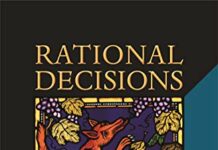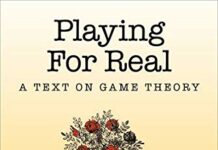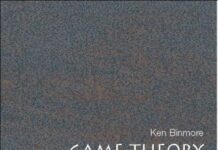
Ebook Info
- Published: 2026
- Number of pages: 424 pages
- Format: PDF
- File Size: 4.49 MB
- Authors: Ken Binmore
Description
A collection of Ken Binmore’s influential papers on bargaining experiments, with the author’s newly written commentary addressing the challenges to game theory posed by the behavioral school of economics.This volume brings together all of Ken Binmore’s influential experimental papers on bargaining along with newly written commentary in which Binmore discusses the underlying game theory and addresses the criticism leveled at it by behavioral economists.When Binmore began his experimental work in the 1980s, conventional wisdom held that game theory would not work in the laboratory, but Binmore and other pioneers established that game theory can often predict the behavior of experienced players very well in favorable laboratory settings. The case of human bargaining behavior is particularly challenging for game theory. Everyone agrees that human behavior in real-life bargaining situations is governed at least partly by considerations of fairness, but what happens in a laboratory when such fairness considerations supposedly conflict with game-theoretic predictions? Behavioral economists, who emphasize the importance of other-regarding or social preferences, sometimes argue that their findings threaten traditional game theory. Binmore disputes both their interpretations of their findings and their claims about what game theorists think it reasonable to predict.Binmore’s findings from two decades of game theory experiments have made a lasting contribution to economics. These papers―some co-authored with other leading economists, including Larry Samuelson, Avner Shaked, and John Sutton―show that game theory does indeed work in favorable laboratory environments, even in the challenging case of bargaining. Does Game Theory Work? The Bargaining Challenge, Volume 2
User’s Reviews
Editorial Reviews: Review “”Does Game Theory Work?” My answer is, ‘Of course not, and why should it?’ But even a hardcore skeptic like me recognizes the charm and conviction in the works of Ken Binmore, which are brought together in this lovely book.”–Ariel Rubinstein, School of Economics, Tel Aviv University, and Department of Economics, New York University”Binmore offers a recipe for making game theory work. He focuses on the most basic of its principles, about which many of the theory’s critics are unaware, and captures their essence in observable terms, which theorists typically fail to do. Binmore develops the science of game theory by demonstrating that these fundamental principles are able to connect perplexing aspects of human behavior that can be captured by no other branch of science, and he does so through the implementation of laboratory methods that leave no question about how they operate.”–Charles R. Plott, Edward S. Harkness Professor of Economics and Political Science, California Institute of Technology”& quot; Binmore offers a recipe for making game theory work. He focuses on the most basic of its principles, about which many of the theory& rsquo; s critics are unaware, and captures their essence in observable terms, which theorists typically fail to do. Binmore develops the science of game theory by demonstrating that these fundamental principles are able to connect perplexing aspects of human behavior that can be captured by no other branch of science, and he does so through the implementation of laboratory methods that leave no question about how they operate.& quot; — Charles R. Plott, Edward S. Harkness Professor of Economics and Political Science, California Institute of Technology& quot; Does Game Theory Work? My answer is, ‘Of course not, and why should it?’ But even a hardcore skeptic like me recognizes the charm and conviction in the works of Ken Binmore, which are brought together in this lovely book.& quot; — Ariel Rubinstein, School of Economics, Tel Aviv University, and Department of Economics, New York University” “Does Game Theory Work?” My answer is, ‘Of course not, and why should it?’ But even a hardcore skeptic like me recognizes the charm and conviction in the works of Ken Binmore, which are brought together in this lovely book.” –Ariel Rubinstein, School of Economics, Tel Aviv University, and Department of Economics, New York University” Binmore offers a recipe for making game theory work. He focuses on the most basic of its principles, about which many of the theory’ s critics are unaware, and captures their essence in observable terms, which theorists typically fail to do. Binmore develops the science of game theory by demonstrating that these fundamental principles are able to connect perplexing aspects of human behavior that can be captured by no other branch of science, and he does so through the implementation of laboratory methods that leave no question about how they operate.” –Charles R. Plott, Edward S. Harkness Professor of Economics and Political Science, California Institute of Technology–Charles R. Plott, Edward S. Harkness Professor of Economics and Political Science, California Institute of Technology Review Does Game Theory Work? My answer is, ‘Of course not, and why should it?’ But even a hardcore skeptic like me recognizes the charm and conviction in the works of Ken Binmore, which are brought together in this lovely book.―Ariel Rubinstein, School of Economics, Tel Aviv University, and Department of Economics, New York University About the Author Ken Binmore is Emeritus Professor at University College London. A Fellow of the Econometric Society and the British Academy, he is the author of Game Theory and the Social Contract, Volume 1: Playing Fair (1994) and Volume 2: Just Playing (1998), and the coeditor of Frontiers of Game Theory (1993), all three published by The MIT Press. Read more
Reviews from Amazon users which were colected at the time this book was published on the website:
⭐For me having read quite a lot of books/articles by the behaviorist school and their “friends” (Gintis, Bowles, Boyd, Richerson, Ostrom,…) this was very good reading. Binmore is very analytic, honest and has lot of good critiques on the behaviorists. After reading this book I got some good insight on the strengths and weakness of the behaviorist school.This book is very technical – it requires some knowlesdge on mathematics to understand this. I would compare with ”
⭐” by Boyd and Richerson in that respect.But if you have enough interest on the issue also this book is certianly worth the effort.I also found a very interesting link when reading this book: […]Binmore first said sommething like “if you are claiming the other-regarding prefeneces must be included as part of the utility functions like Fehr et al are saying, you should at least show the mechanism how such a thing has been created by evolution”. Then he links to the Weibull&Samuelsson article above which really shows such a mechanism.Weibull and Samuelsson are showing that in certain situations individuals are optimising something like u*U, where u is your individual utility and U the sum of the utilities of the members of your community.Reading the article by Weibull and Samuelsson made me to think about Marglin’s book
⭐and what he said about amishes: Amishes do not accept insurances because insuring your property make you less dependent on your community.Amishes are so dependent on their community that they are probably optimising u*U instead of just u. They had to solve the problem of free riding what comes to producing the public good (U).They have actually themselves transformed their utility function from u to u*U by forbidding e.g. the insurances. By transforming the utility function to u*U they are actually creating a superorganism much in the same sense as the eusocial insect societies have done ?
⭐Me entregaron en tiempos y fue de manera oportuna me encanto que me atendieran muy rápido. Muy bueno y voy a recomendar la página de amazon México.
⭐
Keywords
Free Download Does Game Theory Work? The Bargaining Challenge (Economic Learning and Social Evolution) in PDF format
Does Game Theory Work? The Bargaining Challenge (Economic Learning and Social Evolution) PDF Free Download
Download Does Game Theory Work? The Bargaining Challenge (Economic Learning and Social Evolution) 2026 PDF Free
Does Game Theory Work? The Bargaining Challenge (Economic Learning and Social Evolution) 2026 PDF Free Download
Download Does Game Theory Work? The Bargaining Challenge (Economic Learning and Social Evolution) PDF
Free Download Ebook Does Game Theory Work? The Bargaining Challenge (Economic Learning and Social Evolution)



